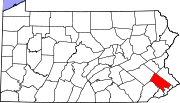Gulph Mills, Pennsylvania
Gulph Mills | |
|---|---|
Unincorporated community | |
 Gulph Mill which supplied grain to George Washington's army. Photograph c. 1922 | |
 Gulph Mills Location within the U.S. state of Pennsylvania | |
| Coordinates: 40°4′8″N 75°20′24″W / 40.06889°N 75.34000°WCoordinates: 40°4′8″N 75°20′24″W / 40.06889°N 75.34000°W | |
| Country | United States |
| State | Pennsylvania |
| County | Montgomery |
| Township | Upper Merion |
| Elevation | 148 ft (45 m) |
| Time zone | UTC-5 (Eastern (EST)) |
| • Summer (DST) | UTC-4 (EDT) |
| ZIP code | 19406 |
| Area code(s) | 610 and 484 |
| GNIS feature ID | 1176308[1] |
Gulph Mills is an unincorporated community in Upper Merion Township, Montgomery County, Pennsylvania. It is served by the Upper Merion Area School District. There is a station on the Norristown High Speed Line.
A grist mill built here in 1747 supplied flour to the Continental Army during their stay at Valley Forge. General George Washington's army encamped in the area for a week before departing for winter quarters at Valley Forge. Washington used the area as an ammunition depot during the autumn of 1777.[2] The encampment is marked by a memorial erected by the Sons of the American Revolution in 1893.
Another attraction here is the "Hanging Rock", a major distraction on Pennsylvania Route 320. Hanging Rock reportedly holds importance as a place by which George Washington led his troops. PennDOT has looked to remove Hanging Rock, but preservationists have battled such action since the 1970s.
The Bridge in Upper Merion Township and Hanging Rock are listed on the National Register of Historic Places.[3]


References[]
- ^ "Gulph Mills". Geographic Names Information System. United States Geological Survey.
- ^ Develin, Dora Harvey (1922). Historic Lower Merion and Blockley. Bala, Lower Merion. p. 31.
gulph mill.
- ^ "National Register Information System". National Register of Historic Places. National Park Service. July 9, 2010.
- Pennsylvania Main Line
- Unincorporated communities in Montgomery County, Pennsylvania
- Unincorporated communities in Pennsylvania
- Upper Merion Township, Montgomery County, Pennsylvania


